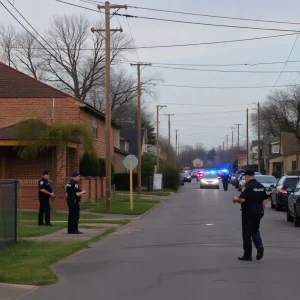Memphis, Tennessee – A troubling incident unfolded here recently that highlighted issues of trust, safety, and violence. On August 25, police responded to a harrowing report of a forcible rape that occurred in the 200 block of Shady Court. The events leading to this disturbing situation involved a seemingly friendly gathering between two individuals who had previously been on a few dates.
The victim, who had invited her acquaintance to her home, never expected that the evening would end in trauma. According to reports, the accused, a man named Tamarcus Alexander, became enraged after he accessed the victim’s cell phone. It’s not clear what he found that upset him so much, but it was enough to trigger a violent reaction. In a shocking turn of events, Alexander allegedly started hitting the victim multiple times in the head and stomach, which ultimately knocked her unconscious.
When the victim regained consciousness, the nightmare wasn’t over. Reports indicate that Alexander continued to physically assault her in a brutal manner, threatening her life in the process. He allegedly choked her while making threats that left her terrified for her safety. Feeling trapped in a horrific situation, she managed to escape and sought medical assistance.
After the assault, the victim was admitted to the hospital where she stayed for two days. She suffered from a concussion, suffered transient memory loss, and endured severe headaches. This kind of physical and mental trauma can have lasting effects, and recovery isn’t just about physical healing; it also involves emotional and psychological support.
During her time in the hospital, the victim courageously spoke to investigators about the incident. She provided a signed statement detailing her experience and was able to identify Alexander in a lineup. This clarity helped law enforcement swiftly act, and Alexander was arrested shortly thereafter and charged with both rape and aggravated assault.
This case raises important conversations about trust and personal space in relationships. Victims of such crimes often face enormous psychological burdens following violent incidents. The transition from victim to survivor can be replete with challenges, from seeking justice to healing from trauma.
Many people may wonder how something so horrific can happen, especially in a seemingly safe environment. It’s crucial to recognize that domestic violence and sexual assault can occur in everyday scenarios, and not just in secluded, high-risk settings. Understanding the signs of controlling behavior—like going through someone’s personal belongings or invading privacy—can be vital in evaluating one’s relationships.
In this particular case, the victim thought she was spending time with a friend, someone she had been getting to know. Unfortunately, Alexander’s actions showcased a dangerous escalation of emotions over what should have been a low-stakes encounter. Instead, it turned into a life-altering event for the victim.
On a broader level, incidents like this spark discussions about prevention and awareness. Community leaders and organizations often emphasize the need for better education regarding consent and personal boundaries, primarily focusing on empowering individuals to speak up and seek help if they find themselves in dangerous situations.
Support systems are critical, including the role of police, hospitals, and advocacy groups that help victims navigate the aftermath of such traumatic experiences. Many cities offer resources for victims of domestic violence and sexual assault, ensuring that they have access to safe spaces and professional assistance.
The community’s response to such incidents matters significantly. Voice and support from community members can also play a crucial role in helping victims feel less isolated and alone in their experiences. Advocacy and awareness can foster a sense of unity and empowerment that transcends fear.
In the case of Tamarcus Alexander, it remains to be seen how the legal proceedings will unfold. However, it is a stark reminder that trust must be accompanied by genuine respect for personal boundaries in any kind of relationship. No one should ever feel unsafe in their own home or by someone they invited into their life.
As updates on this case emerge, many will undoubtedly hope for swift justice for the victim, as well as the encouragement for others to come forward and share their experiences. The community must continue to advocate for a safer environment for all, where respect, consent, and healthy relationships are the norms, not exceptions.








